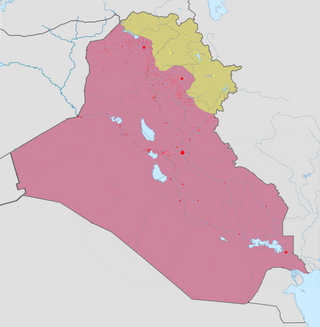
Iraq is a country in Western Asia that largely corresponds with the territory of ancient Mesopotamia. The history of Mesopotamia extends from the Lower Paleolithic period until the establishment of the Caliphate in the late 7th century AD, after which the region came to be known as Iraq. Encompassed within Iraqi territory is the ancient land of Sumer, which came into being between 6000 and 5000 BC during the Neolithic Ubaid period of Mesopotamian history, and is widely considered the oldest civilization in recorded history. It is also the historic center of the Akkadian, Neo-Sumerian, Babylonian, Neo-Assyrian, and Neo-Babylonian empires, a succession of local ruling dynasties that reigned over Mesopotamia and various other regions of the Ancient Near East during the Bronze and Iron Ages.

Saddam Hussein Abd al-Majid al-Tikriti was an Iraqi politician and revolutionary who served as the fifth president of Iraq from 1979 to 2003. He also served as prime minister of Iraq from 1979 to 1991 and later from 1994 to 2003. He was a leading member of the revolutionary Arab Socialist Ba'ath Party, and later, the Baghdad-based Ba'ath Party and its regional organization, the Iraqi Ba'ath Party, which espoused Ba'athism, a mix of Arab nationalism and Arab socialism.

Iraq actively researched and later employed weapons of mass destruction (WMD) from 1962 to 1991, when it destroyed its chemical weapons stockpile and halted its biological and nuclear weapon programs as required by the United Nations Security Council. The fifth president of Iraq, Saddam Hussein, was internationally condemned for his use of chemical weapons during the 1980s campaign against Iranian and Kurdish civilians during and after the Iran–Iraq War. In the 1980s, Saddam pursued an extensive biological weapons program and a nuclear weapons program, though no nuclear bomb was built. After the Gulf War (1990–1991), the United Nations located and destroyed large quantities of Iraqi chemical weapons and related equipment and materials; Iraq ceased its chemical, biological and nuclear programs.
United Nations Special Commission (UNSCOM) was an inspection regime created by the United Nations to ensure Iraq's compliance with policies concerning Iraqi production and use of weapons of mass destruction after the Gulf War. Between 1991 and 1997 its director was Rolf Ekéus; from 1997 to 1999 its director was Richard Butler.

This article describes the positions of world governments before the actual initiation of the 2003 invasion of Iraq, and not their current positions as they may have changed since then.

The Oil-for-Food Programme (OIP), established by the United Nations in 1995 was established to allow Iraq to sell oil on the world market in exchange for food, medicine, and other humanitarian needs for ordinary Iraqi citizens without allowing Iraq to boost its military capabilities.

Iraq under the Arab Socialist Ba'ath Party saw severe violations of human rights. Secret police, state terrorism, torture, mass murder, genocide, ethnic cleansing, rape, deportations, extrajudicial killings, forced disappearances, assassinations, chemical warfare, and the destruction of the Mesopotamian marshes were some of the methods Saddam Hussein and the country's Ba'athist government used to maintain control. Saddam committed crimes of aggression during the Iran–Iraq War and the Gulf War, which violated the Charter of the United Nations. The total number of deaths and disappearances related to repression during this period is unknown, but is estimated to be at least 250,000 to 290,000 according to Human Rights Watch, with the great majority of those occurring as a result of the Anfal genocide in 1988 and the suppression of the uprisings in Iraq in 1991. Human Rights Watch and Amnesty International issued regular reports of widespread imprisonment and torture.
The following lists events in the year 2003 in Iraq.

United Nations Security Council resolution 1483, adopted on 22 May 2003, after recalling all previous resolutions on the situation between Iraq and Kuwait, the Council lifted trade sanctions against Iraq and terminated the Oil-for-Food Programme.
Emergency is a humanitarian NGO that provides free medical treatment to the victims of war, poverty, and landmines. It was founded in 1994. Gino Strada, one of the organization's co-founders, served as EMERGENCY's Executive Director. It operates on the premise that access to high-quality healthcare is a fundamental human right.
On 6 August 1990, four days after the Iraqi invasion of Kuwait, the United Nations Security Council (UNSC) placed a comprehensive embargo on Iraq. The sanctions stayed largely in force until 22 May 2003, and persisted in part, including reparations to Kuwait. The original stated purposes of the sanctions were to compel Iraq to withdraw from Kuwait, to pay reparations, and to disclose and eliminate any weapons of mass destruction (WMD).

There are various rationales for the Iraq War, both the 2003 invasion of Iraq and the subsequent hostilities. The George W. Bush administration began actively pressing for military intervention in Iraq in late 2001. The primary rationalization for the Iraq War was articulated by a joint resolution of the United States Congress known as the Iraq Resolution. The US claimed the intent was to "disarm Iraq of weapons of mass destruction, to end Saddam Hussein's support for terrorism, and to free Iraqi people".
Veterans for Common Sense (VCS), founded in 2002, is a non-profit organization dedicated to advocacy on behalf of United States veterans who continue to serve their country by protecting the rights and interests of fellow citizens. Based on the pragmatic ideals of the American Patriot Thomas Paine, VCS was established "by service-minded war veterans who believe we, the people, are most secure when our country is strong and responsibly engaged with the world."

Raed Jarrar is an Arab-American architect, blogger, and political advocate based in the U.S. Capital Washington, DC.

David Cortright is an American scholar and peace activist. He is a Vietnam veteran who is currently Professor Emeritus and special adviser for policy studies at the Keough School of Global Affairs and Kroc Institute for International Peace Studies at the University of Notre Dame, and the author, co-author, editor or co-editor of 22 books. Cortright has a long history of public advocacy for disarmament and the prevention of war.
Health in Iraq refers to the country's public healthcare system and the overall health of the country's population. Iraq belongs to WHO health region Eastern Mediterranean and classified as upper middle according to World Bank income classification 2013. The state of health in Iraq has fluctuated during its turbulent recent history and specially during the last 4 decade. The country had one of the highest medical standards in the region during the period of 1980s and up until 1991, the annual total health budget was about $450 million in average. The 1991 Gulf War incurred Iraq's major infrastructures a huge damage. This includes health care system, sanitation, transport, water and electricity supplies. UN economic sanctions aggravated the process of deterioration. The annual total health budget for the country, a decade after the sanctions had fallen to $22 million which is barely 5% of what it was in 1980s. During its last decade, the regime of Saddam Hussein cut public health funding by 90 percent, contributing to a substantial deterioration in health care. During that period, maternal mortality increased nearly threefold, and the salaries of medical personnel decreased drastically. Medical facilities, which in 1980 were among the best in the Middle East, deteriorated. Conditions were especially serious in the south, where malnutrition and water-borne diseases became common in the 1990s. Health indicators deteriorated during the 1990s. In the late 1990s, Iraq's infant mortality rates more than doubled. Because treatment and diagnosis of cancer and diabetes decreased in the 1990s, complications and deaths resulting from those diseases increased drastically in the late 1990s and early 2000s.

After World War I, Iraq passed from the failing Ottoman Empire to British control. Kingdom of Iraq was established under the British Mandate in 1932. In the 14 July Revolution of 1958, the king was deposed and the Republic of Iraq was declared. In 1963, the Ba'ath Party staged a coup d'état and was in turn toppled by another coup in the same year, but managed to retake power in 1968. Saddam Hussein took power in 1979 and ruled Iraq for the remainder of the century, during the Iran–Iraq War of the 1980s, the Invasion of Kuwait and the Gulf War of 1990 to 1991 and the UN sanction during the 1990s. Saddam was removed from power in the 2003 invasion of Iraq.

Ba'athist Iraq, officially the Iraqi Republic (1968–1992) and later the Republic of Iraq (1992–2003), was the Iraqi state between 1968 and 2003 under the rule of the Arab Socialist Ba'ath Party. This period began with high economic growth, but ended with the country facing severe levels of socio-political isolation and economic stagnation. By the late 1990s, the average annual income had decreased drastically due to a combination of external and internal factors. UNSC sanctions against Iraq, in particular, were widely criticized for negatively impacting the country's quality of life, prompting the establishment of the Oil-for-Food Programme. The Ba'athist period formally came to an end with the 2003 invasion of Iraq, and the Ba'ath Party has since been indefinitely banned across the country.

The Iraqi conflict refers to a near-continuous series of events that began with the 2003 invasion of Iraq and deposition of Iraqi president Saddam Hussein.

Casualty recording is the systematic and continuous process of documenting individual direct deaths from armed conflict or widespread violence. It aims to create a comprehensive account of all deaths within a determined scope, usually bound by time and location.













